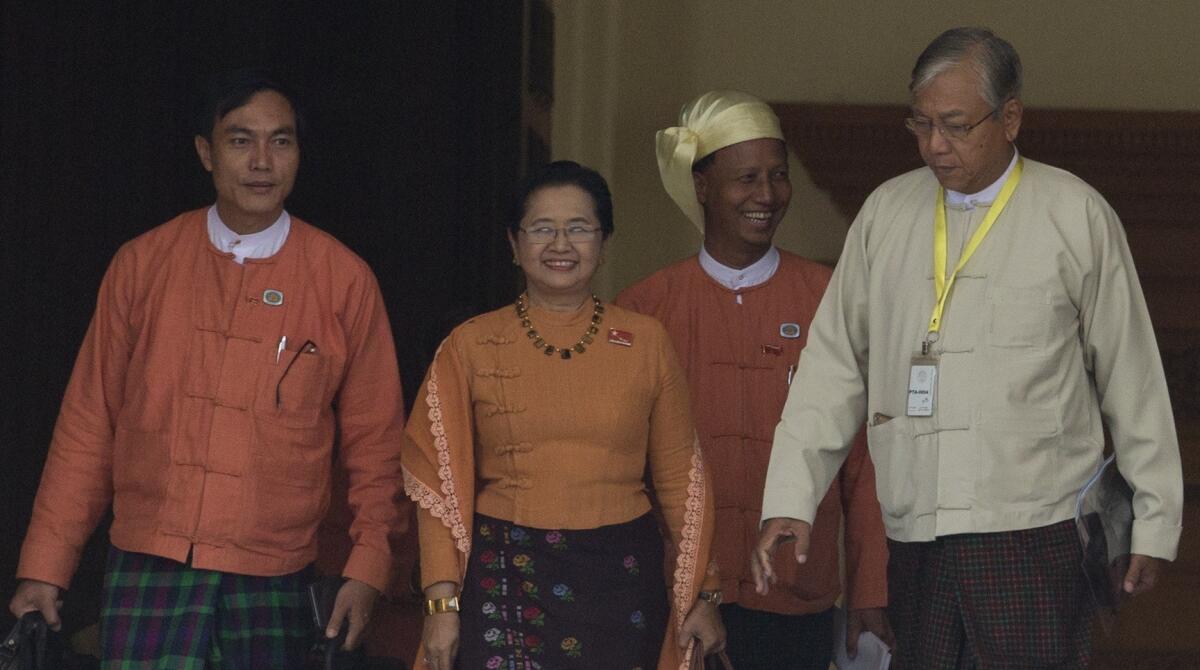Who is Htin Kyaw, Myanmar’s new president?

Htin Kyaw, right, the newly elected president of Myanmar, and his wife, lawmaker Su Su Lwin, leave the parliament building in Naypyitaw on March 15.
- Share via
Reporting from Mumbai, India — A childhood friend of Nobel Peace Prize winner Aung San Suu Kyi was elected Tuesday as Myanmar’s new president, a major step for a country ruled or partially ruled by the military for more than half a century.
Htin Kyaw, 69, the first civilian to hold the presidency, was selected by lawmakers in Myanmar’s capital, Naypyitaw, following parliamentary elections in November in which Suu Kyi’s pro-democracy opposition party won by a landslide.
The choice marks a significant milestone for Myanmar, also known as Burma. Beginning in 2011, a ruling junta began implementing democratic reforms, which prompted the United States and other countries to lift longstanding economic sanctions.
“This is a victory for the people of this country,” Htin Kyaw told reporters in brief remarks.
Htin Kyaw is expected to take direction from Suu Kyi, who said before the November election that she would hold a position “above the president” if her National League of Democracy party won a majority. The former military junta barred Suu Kyi, a former political prisoner, from ascending to the country’s highest office by instituting a law disqualifying anyone with foreign family members. Suu Kyi’s late husband was British.
“He will be a most obedient servant for Aung San Suu Kyi,” Robert San Aung, a human rights lawyer, said by phone from Yangon.
Htin Kyaw, a member of the NLD executive committee, was hardly a household name in Myanmar, and even after his selection Tuesday news outlets were struggling to confirm pieces of his biography.
A resume posted on Facebook by a party official said Htin Kyaw earned a master’s degree in economics from Yangon University before working in economic affairs for the Foreign Ministry in the 1980s. The party did not confirm if the biography was official.
He has won praise for being a loyal member of Suu Kyi’s party, which has led the struggle for democratic rule for decades. He is a director at a charitable foundation named for Suu Kyi’s mother and remained close to her when she was placed under house arrest by the generals, even being jailed himself when he once attempted to accompany her on a trip to the city of Mandalay.
Historian Thant Myint-U called him “a very nice man” of “unimpeachable integrity.”
Under Myanmar’s system, the president is chosen by the parliament, which reserves one-quarter of the seats for the military. Htin Kyaw (pronounced “Chaw”) was nominated by Suu Kyi’s party and won 360 out of 652 votes cast by lawmakers Tuesday.
A candidate chosen by the military bloc, Myint Swe, won the second most votes and will become the first vice president. Myint Swe remains on a U.S. government blacklist because of his ties to former junta leader Than Shwe, a sign of the continued challenges to U.S. efforts to reengage with Myanmar.
It remained unclear whether Suu Kyi would hold any position in the new government. Analysts said she was likely to serve as a kind of puppet master, determining the party’s political agenda, including rapprochement with the outside world and jump-starting a long isolated economy.
Many of Myanmar’s 53 million people are expecting significant changes, but under military rule, public institutions ceased to function effectively. Suu Kyi has issued only vague policy ideas, and analysts say it remains to be seen whether her party can make the transition from pro-democracy activism to competent governance.
“Odds are that the NLD’s economic goals will not be met” because Myanmar’s state institutions “are not up to the job,” Lex Rieffel, a senior fellow at the Brookings Institution in Washington, wrote in a commentary.
The government will also have to contend with pressure from China, which grew close to the military government and has also courted Suu Kyi. In recent weeks, Chinese officials have signaled that they will try to restart construction on the Myitsone Dam, a mammoth hydropower project on Myanmar’s Irrawaddy River that was suspended five years ago because of intense domestic opposition.
Suu Kyi has not taken a public stance on the proposed 3,000-megawatt dam, which would export nearly all of its electricity into China’s Yunnan province. Green activists say it would give China outsize control of the Irrawaddy, an essential source of water and fish for Myanmar’s southern delta.
Twitter: @SBengali
ALSO
Report finds little progress at curbing Border Patrol abuses
New study shows widespread risk of quake damage in Taiwan
Big debt by some wealthy borrowers in India sparks outcry, especially when the good times roll
More to Read
Sign up for Essential California
The most important California stories and recommendations in your inbox every morning.
You may occasionally receive promotional content from the Los Angeles Times.











